FACETS Analysis
Task 1: Analysis
In the sphere of modern businesses, the key to success is to develop entrepreneurial and creative skills. There are certain key competencies and skills which one has to grow in order to enhance the degree of the potential of one’s creativity and entrepreneurial mindset. There are certain diagnostic tools that can help an individual in ascertaining his/her degree of competence in this respect. The FACETS framework is among such analytic tools that can pave the way for an individual to determine his/her skills in terms of developing into a creative and entrepreneurial performer.
The FACETS analysis has made me understand my strengths and weaknesses in terms of being a creative and entrepreneurial being. I have understood that being an individual who is always target-focused, I have the capability of completing tasks within the given deadline (Plaskett, 2017). Though I have to develop myself more in terms of becoming a product champion, being a good judge of what is important and what is not, I always provide myself the opportunity to bring about self-development. This is a part of my entrepreneurial skills. I am a visionary who has the skill to determine what present resources can be actually used for in the future appropriately to accomplish objectives and goals, and my patience adds to my skill level in this respect (NASSCOM, 2014). I am an achiever who never relies on others for task-completion. My organizational skills have made me a time-oriented individual who is almost always capable of meeting deadlines. This is yet another of my entrepreneurial skills and this is because; being a time-oriented individual I always set examples for others (Lewis, 2016). Conducting the FACETS analysis I have also realized that I have a professional mindset which allows me to sustain my work/life balance, making me more capable of handling my jobs without excessive stress. I also think that I have the entrepreneurial skill of spotting opportunities and picking the same at the right time. This skill has helped me in enhancing my creative skills constituting the skill of generating fruitful ideas and developing solutions for resolving problems that may act as barriers to my success. Moreover, being a less egoistic person (and more empathetic individual) I have emerged into a good team player, who, apart from being professional, is also amicable and social. And these skills have also helped me in enhancing my entrepreneurial skills. Moreover, my GET Test score of 78% has made me understand that I am a person with strong creative tendencies that I like to express through innovative and inventive activities (Lumsdaine & Binks, 2007). I have also understood, by analyzing and interpreting the result, that, though I am not highly enterprising till date, I have got good chances of becoming so primarily because I have high creative tendencies (“Occasionally enterprising”, n.d.), and creativity paves the way for innovation, and innovation helps an individual to develop entrepreneurial skills. Also, my high calculative risk-taking tendency has allowed me to become a more decisive individual who is able to capable of acting on incomplete information and providing good judgment when incomplete information suffice the action plan (“Occasionally enterprising”, n.d.). I have also understood that I have analytical skills, and these skills have made me good at “evaluating the likely benefits against the likely costs of actions” (“Occasionally enterprising”, n.d.). Furthermore, in the GET Test I have scored high on internal locus of control, and that means that I am opportunistic and have ample self-confidence (“Occasionally enterprising”, n.d.). It is my self-confidence which helps me in being proactive and taking personal responsibility in terms of navigating problems that arise in the course of achieving success on my terms (Matthynssens, 2017). Moreover, my entrepreneurial skills audit result also shows that I have a greater chance of becoming a good entrepreneur in the future due to having certain traits that are essential for becoming an entrepreneur. Also, quite interestingly, the brain dominance test revealed that my left brain is dominant (“Brain Dominance Test (Online-Test)”, n.d.). This means that I am logical, strategic, and rational (Hodgekiss, 2014), and these traits are essential to becoming a creative entrepreneur.
Also, I must confess that the analysis of my personality traits has also confirmed my chances of emerging as a creative entrepreneur (as reflected by the result of the FACETS analysis). The Jung Typology test has revealed that my personality should be described as ENTJ (Extravert, Intuitive, Thinking, Judging). The test result showed that I am 72% extravert, 19% intuitive, 1% thinking, and 53% judging (“Humanmetrics Jung Typology Test”, n.d.), and such test score indicates that I am on the right track of becoming a creative entrepreneur in the long run. Moreover, considering the result of the Belbin Team Roles Test, I must say that, as a team member, I must be appropriately described as Resource Investigator (Mind Tools, n.d.). Several of my other trait-related tests have proved that I am an extrovert individual, and extroversion is a characteristic trait of a team member who is Resource Investigator and who has an entrepreneurial mindset (Lee, 2016). Also, fitting to the concerned team role, I am enthusiastic, communicative, opportunistic, and social. All the aforesaid traits have helped me in emerging as a good team player who knows how to work in a team and with the team in the course of accomplishing organizational objectives and goals.
In conclusion, the FACETS analysis has made me understand my strengths and weaknesses in terms of being a creative and entrepreneurial being. I have understood that being an individual who is always target-focused, I have the capability of completing tasks within the given deadline. Conducting the FACETS analysis I have also realized that I have a professional mindset which allows me to sustain my work/life balance, making me more capable of handling my jobs without excessive stress. I also think that I have the entrepreneurial skill of spotting opportunities and picking the same at the right time. Moreover, my organizational skills have made me a time-oriented individual who is almost always capable of meeting deadlines. This is yet another of my entrepreneurial skills and this is because; being a time-oriented individual I always set examples for others.
References
Brain Dominance Test (Online-Test) (n.d.) [Online] Available at:http://www.ipn.at/ipn.asp?BHX [Accessed 24 February 2017]
Confidence–A-Key-Ingredient-to-Personal-and-Business-Success.html [Accessed 28 February 2017]
Hodgekiss, A. (2014). Are you right-brained or left-brained? And what does it say about your personality? Take this interactive QUIZ to find out. Mail Online. [Online] Available at:http://www.dailymail.co.uk/health/article-2569288/Are-right-brained-left-brained-And-does-say-personality-Take-interactive-QUIZ-out.html [Accessed 24 February 2017]
Humanmetrics Jung Typology Test (n.d.) [Online] Available at http://www.humanmetrics.com/hr/jtypesresult.aspx [Accessed 24 February 2017]
Occasionally enterprising (n.d.) [Online] Available at:http://get2test.net/test/results.htm [Accessed 24 February 2017]
Lewis, L. (2016). Goal Oriented Entrepreneurs [Online] Available at:https://www.larry-lewis.com/2705/goal-oriented-entrepreneurs [Accessed 28 February 2017]
Lee, L. (2016). Extroverts may be key to a startup’s success [Online] Available at:https://qz.com/614852/extroverts-may-be-key-to-a-startups-success/ [Accessed 28 February 2017]
Lumsdaine, E. & Binks, M. (2007). Entrepreneurship from Creativity to Innovation. Oxford: Trafford Publishing.
Matthynssens, C. (2017). Self Confidence – A Key Ingredient to Personal and Business Success! [Online] Available at:http://www.evancarmichael.com/library/cheryl-matthynssens/Self-
Mind Tools (n.d.). Belbin’s Team Roles [Online] Available at:Â https://www.mindtools.com/pages/article/newLDR_83.htm [Accessed 28 February 2017]
NASSCOM (2014). Successful Entrepreneurs are Visionaries [Online] Available at: http://www.nasscom.in/successful-entrepreneurs-are-visionaries [Accessed 24 February 2017]
Plaskett, R.E. (2017). 6 Time Management Skills For Entrepreneurs [Online] Available at: https://christianpf.com/6-time-management-skills-for-entrepreneurs/
Appendix A
GET Test (Result Score 78%) (Retrieved from http://get2test.net/test/index.htm)
1) I would not mind routine unchallenging work if the pay and pension prospects were good.
Tend to Agree
Tend to Disagree
2) I like to test boundaries and get into areas where few have worked before.
Tend to Agree
Tend to Disagree
3) I tend not to like to stand out or be unconventional.
Tend to Agree
Tend to Disagree
4) Capable people who fail to become successful have not usually taken chances when they have occurred.
Tend to Agree
Tend to Disagree
5) I rarely day dream.
Tend to Agree
Tend to Disagree
6) I find it difficult to switch off from work completely.
Tend to Agree
Tend to Disagree
7) You are either naturally good at something or you are not, effort makes no difference.
Tend to Agree
Tend to Disagree
8) Sometimes people find my ideas unusual.
Tend to Agree
Tend to Disagree
9) I would rather buy a lottery ticket than enter a competition.
Tend to Agree
Tend to Disagree
10) I like challenges that stretch my abilities and get bored with things I can do quite easily.
Tend to Agree
Tend to Disagree
11) I would prefer to have a moderate income in a secure job rather than a high income in a job that depended on my performance.
Tend to Agree
Tend to Disagree
12) At work, I often take over projects and steer them my way without worrying about what other people think.
Tend to Agree
Tend to Disagree
13) Many of the bad times that people experience are due to bad luck.
Tend to Agree
Tend to Disagree
14) Sometimes I think about information almost obsessively until I come up with new ideas and solutions.
Tend to Agree
Tend to Disagree
15) If I am having problems with a task I leave it, forget it and move on to something else.
Tend to Agree
Tend to Disagree
16) When I make plans I nearly always achieve them.
Tend to Agree
Tend to Disagree
17) I do not like unexpected changes to my weekly routines.
Tend to Agree
Tend to Disagree
18) If I wanted to achieve something and the chances of success were 50/50 I would take the risk.
Tend to Agree
Tend to Disagree
19) I think more of the present and past than of the future.
Tend to Agree
Tend to Disagree
20) If I had a good idea for making some money, I would be willing to invest my time and borrow money to enable me to do it.
Tend to Agree
Tend to Disagree
21) I like a lot of guidance to be really clear about what to do in work.
Tend to Agree
Tend to Disagree
22) People generally get what they deserve.
Tend to Agree
Tend to Disagree
23) I am wary of new ideas, gadgets and technologies.
Tend to Agree
Tend to Disagree
24) It is more important to do a job well than to try to please people.
Tend to Agree
Tend to Disagree
25) I try to accept that things happen to me in life for a reason.
Tend to Agree
Tend to Disagree
26) Other people think that I’m always making changes and trying out new ideas.
Tend to Agree
Tend to Disagree
27) If there is a chance of failure I would rather not do it.
Tend to Agree
Tend to Disagree
28) I get annoyed if people are not on time for meetings.
Tend to Agree
Tend to Disagree
29) Before I make a decision I like to have all the facts no matter how long it takes.
Tend to Agree
Tend to Disagree
30) I rarely need or want any assistance and like to put my own stamp on work that I do.
Tend to Agree
Tend to Disagree
31) You are not likely to be successful unless you are in the right place at the right time.
Tend to Agree
Tend to Disagree
32) I prefer to be quite good at several things rather than very good at one thing.
Tend to Agree
Tend to Disagree
33) I would rather work with a person I liked who was not good at the job, rather than work with someone I did not like even if they were good at the job.
Tend to Agree
Tend to Disagree
34) Being successful is a result of working hard, luck has little to do with it.
Tend to Agree
Tend to Disagree
35) I prefer doing things in the usual way rather than trying out new methods.
Tend to Agree
Tend to Disagree
36) Before making an important decision I prefer to weigh up the pro’s and con’s fairly quickly rather than spending a long time thinking about it.
Tend to Agree
Tend to Disagree
37) I would rather work on a task as part of a team rather than take responsibility for it myself.
Tend to Agree
Tend to Disagree
38) I would rather take an opportunity that might lead to even better things than have an experience that I am sure to enjoy.
Tend to Agree
Tend to Disagree
39) I usually do what is expected of me and follow instructions carefully.
Tend to Agree
Tend to Disagree
40) For me, getting what I want is a just reward for my efforts.
Tend to Agree
Tend to Disagree
41) I like to have my life organised so that it runs smoothly and to plan.
Tend to Agree
Tend to Disagree
42) When I am faced with a challenge I think more about the results of succeeding than the effects of failing.
Tend to Agree
Tend to Disagree
43) I believe that destiny determines what happens to me in life.
Tend to Agree
Tend to Disagree
44) I like to spend time with people who have different ways of thinking.
Tend to Agree
Tend to Disagree
45) I find it difficult to ask for favours from other people.
Tend to Agree
Tend to Disagree
46) I get up early, stay late or skip meals if I have a deadline for some work that needs to be done.
Tend to Agree
Tend to Disagree
47) What we are used to is usually better than what is unfamiliar.
Tend to Agree
Tend to Disagree
48) I get annoyed if superiors or colleagues take credit for my work.
Tend to Agree
Tend to Disagree
49) People’s failures are rarely the result of their poor judgement.
Tend to Agree
Tend to Disagree
50) Sometimes I have so many ideas that I feel pressurised.
Tend to Agree
Tend to Disagree
51) I find it easy to relax on holiday and forget about work.
Tend to Agree
Tend to Disagree
52) I get what I want from life because I work hard to make it happen.
Tend to Agree
Tend to Disagree
53) It is harder for me to adapt to change than keep to a routine.
Tend to Agree
Tend to Disagree
54) I like to start interesting projects even if there is no guaranteed payback for the money or time I have to put in.
Tend to Agree
Disagree
Appendix C
Entrepreneurial Skills Audit (Retrieved from http://wrdf.org/wp-content/uploads/Entrepreneur-Self-Assessment-Survey.pdf)
_(3)____1. I am willing to work 50 hours or more per week regularly.
_(5)____2. My family will support my going into business.
_(5)____3. I am willing to accept both financial and career risks when necessary.
_(5)____4. I don’t need all the fringe benefits provided by conventional employment.
_(5)____5. I would like to take full responsibility for the successes and failures of my business.
_(5)____6. I would experience more financial success by operating my own business.
_(5)____7. I feel a great deal of pride when I complete a project successfully.
_(5)____8. I have a high energy level that can be maintained over a long time.
_(5)____9. I enjoy controlling my own work assignments & making all decisions affecting my work.
_(5)___10. I believe that I am primarily responsible for my own successes and failures.
_(5)___11. I have a strong desire to achieve positive results even when it requires a great deal of additional effort.
_(5)___12. I have a good understanding of how to manage a business.
_(5)___13. I can function in ambiguous situations.
_(1)___14. One or both of my parents were entrepreneurs.
_(4)___15. I believe that my abilities and skills are greater than those of most of my coworkers.
_(5)___16. People trust me and consider me honest and reliable.
_(5)___17. I always try to complete every project I start, regardless of obstacles and difficulties.
_(5)___18. I am willing to do something even when other people laugh or belittle me for doing it.
_(5)___19. I can make decisions quickly.
_(5)___20. I have a good network of friends, professionals, and business acquaintances.
TOTAL:_(93)____
Appendix D
Brain Dominance Test
Are you objective in your opinions? Do you look at the facts, before you make a decision?
Yes
Do you often have hunches and follow your intuition?
Yes
Are you interested in psychology and holistic healing?
Yes
Do you sometimes feel, that you have seen or experienced something before, like in a former lifetime?
Yes
Are you a daydreamer, and are your dreams vivid and exciting?
No
Are you interested in technology and technical solutions?
Yes
Do you learn easier from observation and doing it?
Yes
Do you often judge based on feelings alone?
No
Do you think logically most of the time, and recognize, why people behave in a certain manner?
Yes
Do many think your workplace is messy?
No
Do you always want things in a certain order and the right sequence?
No
Do you cry easily and/or are you easily hurt in your feelings?
No
Do you often think of the past?
No
Do you prefer numbers and facts in a logical sequence?
Yes
Do you prefer a clean desk and working environment?
Yes
Do you like puzzles and word games?
Yes
Do you often act spontaneously? Are you sometimes premature with your conclusions?
Yes
Do you never have enough time?
No
Can you always find the right words to describe your feelings?
Yes
Do you speak a few words of a foreign language?
No
Are you visual? Do you remember places because of their colors?
Yes
Do you have patience, and approach a task from different angles, until you find a solution?
Yes
Are you interested in music, painting, dance and other artistic expressions?
Yes
Is it easy for you to categorize and put away files?
Yes
Do you lack a good sense of time?
No
Do you try to find meaning in something, that doesn’t seem to have a meaning?
Yes
Do you have the ability to plan in rough sketches and describe it?
Yes
Are you romantic and/or is beauty and luxury important to you?
Yes
Result: Left Brain Dominant
Appendix E
Jung Typology Test
1. You are almost never late for your appointments
YESyesuncertainnoNO
2. You like to be engaged in an active and fast-paced job
YESyesuncertainnoNO
3. You enjoy having a wide circle of acquaintances
YESyesuncertainnoNO
4. You feel involved when watching TV soaps
YESyesuncertainnoNO
5. You are usually the first to react to a sudden event: the telephone ringing or unexpected question
YESyesuncertainnoNO
6. You feel that the world is founded on compassion
YESyesuncertainnoNO
7. You think that everything in the world is relative
YESyesuncertainnoNO
8. Strict observance of the established rules is likely to prevent attaining a good outcome
YESyesuncertainnoNO
9. It is difficult to get you excited
YESyesuncertainnoNO
10. When making a decision, you rely more on your feelings than on analysis of the situation
YESyesuncertainnoNO
11. You often think about humankind and its destiny
YESyesuncertainnoNO
12. You believe the best decision is one which can be easily changed
YESyesuncertainnoNO
13. You often ponder the root cause of phenomena and things
YESyesuncertainnoNO
14. You prefer to act immediately rather than speculate about various options
YESyesuncertainnoNO
15. You trust reason rather than feelings
YESyesuncertainnoNO
16. You are inclined to rely more on improvisation than on prior planning
YESyesuncertainnoNO
17. You spend your leisure time actively socializing with a group of people, attending parties, shopping, etc.
YESyesuncertainnoNO
18. You usually plan your actions in advance
YESyesuncertainnoNO
19. Your actions are frequently influenced by your emotions
YESyesuncertainnoNO
20. You are a person somewhat reserved and distant in communication
YESyesuncertainnoNO
21. You know how to put every minute of your time to good purpose
YESyesuncertainnoNO
22. You often contemplate the complexity of life
YESyesuncertainnoNO
23. After prolonged socializing you feel you need to get away and be alone
YESyesuncertainnoNO
24. You often do jobs in a hurry
YESyesuncertainnoNO
25. You easily see the general principle behind specific occurrences
YESyesuncertainnoNO
26. You frequently and easily express your feelings and emotions
YESyesuncertainnoNO
27. You find it difficult to speak loudly
YESyesuncertainnoNO
28. You get bored if you have to read theoretical books
YESyesuncertainnoNO
29. You tend to sympathize with other people
YESyesuncertainnoNO
30. You value justice higher than mercy
YESyesuncertainnoNO
31. You rapidly get involved in the social life of a new workplace
YESyesuncertainnoNO
32. The more people you speak to, the better you feel
YESyesuncertainnoNO
33. You tend to rely on your experience rather than on theoretical alternatives
YESyesuncertainnoNO
34. As a rule, you proceed only when you have a clear and detailed plan
YESyesuncertainnoNO
35. You easily empathize with the concerns of other people
YESyesuncertainnoNO
36. Often you prefer to read a book than go to a party
YESyesuncertainnoNO
37. When with a group of people, you enjoy being directly involved and being at the centre of attention
YESyesuncertainnoNO
38. You are more inclined to experiment than to follow familiar approaches
YESyesuncertainnoNO
39. You are strongly touched by the stories about people’s troubles
YESyesuncertainnoNO
40. Deadlines seem to you to be of relative rather than absolute importance
YESyesuncertainnoNO
41. You prefer to isolate yourself from outside noises
YESyesuncertainnoNO
42. For you, it is easier to gain knowledge through hands-on experience than from books or manuals
YESyesuncertainnoNO
43. You think that almost everything can be analyzed
YESyesuncertainnoNO
44. For you, no surprises is better than surprises – bad or good ones
YESyesuncertainnoNO
45. You take pleasure in putting things in order
YESyesuncertainnoNO
46. You feel at ease in a crowd
YESyesuncertainnoNO
47. You have good control over your desires and temptations
YESyesuncertainnoNO
48. You easily understand new theoretical principles
YESyesuncertainnoNO
49. You usually place yourself nearer to the side than in the center of the room
YESyesuncertainnoNO
50. When solving a problem you would rather follow a familiar approach than seek a new one
YESyesuncertainnoNO
51. A thirst for adventure is something close to your heart
YESyesuncertainnoNO
52. When considering a situation you pay more attention to the current situation and less to a possible sequence of events
YESyesuncertainnoNO
53. When solving a problem you consider the rational approach to be the best
YESyesuncertainnoNO
54. You find it difficult to talk about your feelings
YESyesuncertainnoNO
55. Your decisions are based more on the feeling of a moment than on the thorough planning
YESyesuncertainnoNO
56. You prefer to spend your leisure time alone or relaxing in a tranquil atmosphere
YESyesuncertainnoNO
57. You feel more comfortable sticking to conventional ways
YESyesuncertainnoNO
58. You are easily affected by strong emotions
YESyesuncertainnoNO
59. You are always looking for opportunities
YESyesuncertainnoNO
60. As a rule, current preoccupations worry you more than your future plans
YESyesuncertainnoNO
61. It is easy for you to communicate in social situations
YESyesuncertainnoNO
62. You rarely deviate from your habits
YESyesuncertainnoNO
63. You willingly involve yourself in matters which engage your sympathies
YESyesuncertainnoNO
64. You easily perceive various ways in which events could develop
YESyesuncertainnoNO
 (Extravert, Intuitive, Thinking, Judging).
Appendices E
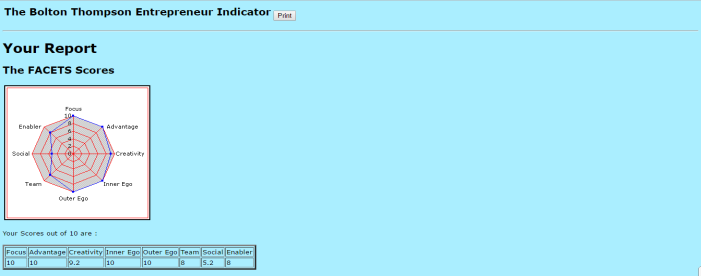
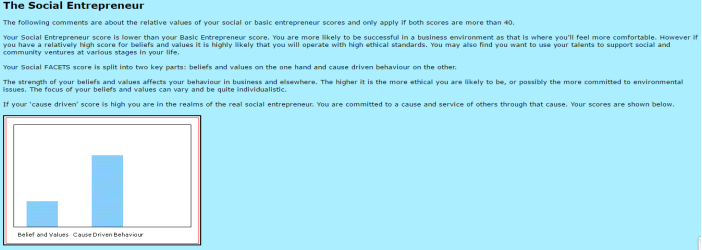




Task 2: Case Study
The case of development of the product, Activmobs, is a pointer to the fact that even today necessity is what triggers innovation. The development of Activmobs had both radical and incremental impact on the targeted population (Engen & Holen, 2014). The primary necessity that instigated the development of Activmobs was the necessity to keep the targeted population healthy (Activ.mob., n.d.). Investigators realized that the nation had been getting less active, and lack of activity resulted in poor health conditions, including obesity, cardiovascular diseases, hypertension (high blood pressure), joint problems, and several other lifestyle diseases (Design Council, 2009). It was to provide a solution to the concerned problem that the investigators worked with the residents of an estate in Kent, and this paved the way for the designers to find out the way which kept people motivated to stay active (Design Council, 2009). The result was the development of Activmobs – “a new way of helping people stay healthy by organising and motivating themselves to do the activities they like” (Design Council, 2009). The case of development of Alzheimer100, on the other hand, is an indicator to the point that the medical world is still evolving and the need for evolution is triggered by the need of keeping humankind well, both physically and psychologically. It can be said that Alzheimer100 had an incremental impact on the targeted population (Zhu & Sano, 2006). The innovation came into being for addressing the problem of determining the practical steps that were needed to be taken to improve the daily life and the quality of life of people suffering from dementia (Alzheimer100, n.d.). The innovation also took place as a result of the effort to help the caregivers of patients with dementia some specific helps in the course of care-giving (Tan, 2009). To mitigate the concerned problems, the designers worked with patients and carers, and in this way they identified the real challenges that were actually faced by people who lived or worked with dementia, and the designers used video diaries and creative workshops in the course of getting to the root of the problem (Dott, 2009). The result of the effort was the emergence of four different ideas which included the Dementia Signpost Service and a volunteer mentoring scheme that was supported by TimeBank (Dott, 2009). The case study on the development of B&Q power tools, on the other hand, unlike the other case studies, shows how apart from medical needs, some daily needs act as propellers to usher innovation, making daily activities easier for individuals. The manufacturer of the concerned brand of power tools realized that many of the power tools were becoming too much hard for older customers to use (Design Council, 2008). To mitigate the problem a research project was conducted, and the project was meant to find out ways in which the development of an ergonomically designed product range for all customers can be initiated (Design Council, 2008). The result of such a research project was the development of the award-winning products of B&Q. The inclusive design and the easiness of use made the products suitable for the targeted segment of customers in an appropriate manner. It must be noted that the products’ innovation had a radical impact on the targeted population.
It has been observed, going through the three specific case studies that several different needs triggered the urge for the development of different products. But whatever might be the genre of product, the innovative approach that led to the development of the products contributed to the enhancement of the market image and reputation of the organizations developing the innovative products. It must be noted in this respect that, “Just as firms compete for customers, they also vie for reputational status across their relevant constituent groups. To many firms, a reputation as an innovative company is something that is both prized and actively sought after” (Henard & Dacin, 2010). Reputation for product innovation (RPI) is a concept that has been considered today by many firms as one of those aspects that are needed to be taken care of to ensure the obtainment of the competitive advantage. Product innovation is the key to success in today’s competitive business world. Innovative firms are more at advantage of drawing the attention of talents, and firms that are infused with talents are the ones that are going to succeed in the long run, keeping constant all the other factors that are needed for accomplishing organisational success. The fact that the reputation of being supportive of product innovation can enhance customers trust and loyalty level has been proved in the case study on B&Q power tools. It has been observed in the case study that a firm that puts emphasis on product innovation is the one that is capable of drawing the attention of talents. B&Q’s reputation of being an innovative firm made it easier for it to join the Helen Hamlyn Research Associate Programme and to thereby partner with talented young RCA design graduates in the course of developing innovatively designed products (Design Council, 2008). The result had been the development of power tools perfect for the use of older population (B&Q, 2016). This outcome enhanced the customer base of B&Q considerably, proving the fact that product innovation is a means of accomplishing market reputation and organizational success. Hence, it can be said that innovation is the key to success for today’s firms that are competing with each other to gain the market share and to sustain profitability. Product innovation is a process which not only strengthens an organisation’s image externally but internally too; such an approach infuses more energy and new talents into the organizational body. It must be taken into account that, “Empirical results indicate that a high consumer perceived RPI, via the involvement construct, leads to excitement toward and heightened loyalty to the innovative firm” (Henard & Dacin, 2010). It is the securing of such customer loyalty which eventually matters in the long run in the context of sustaining market reputation and profitability. So, it must be again stated that product innovation is a process which not only strengthens an organisation‘s image externally but internally too; such an approach infuses more energy and new talents into the organisational body.
Appendices

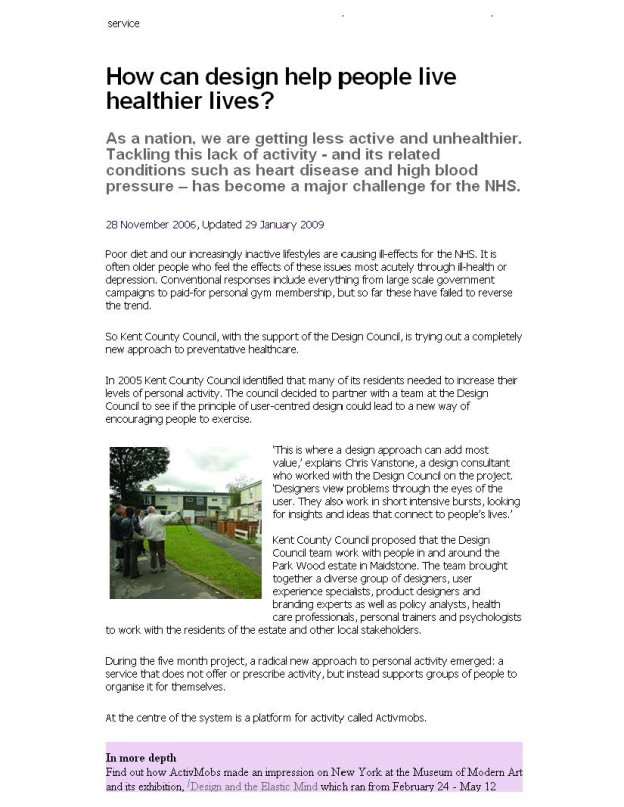
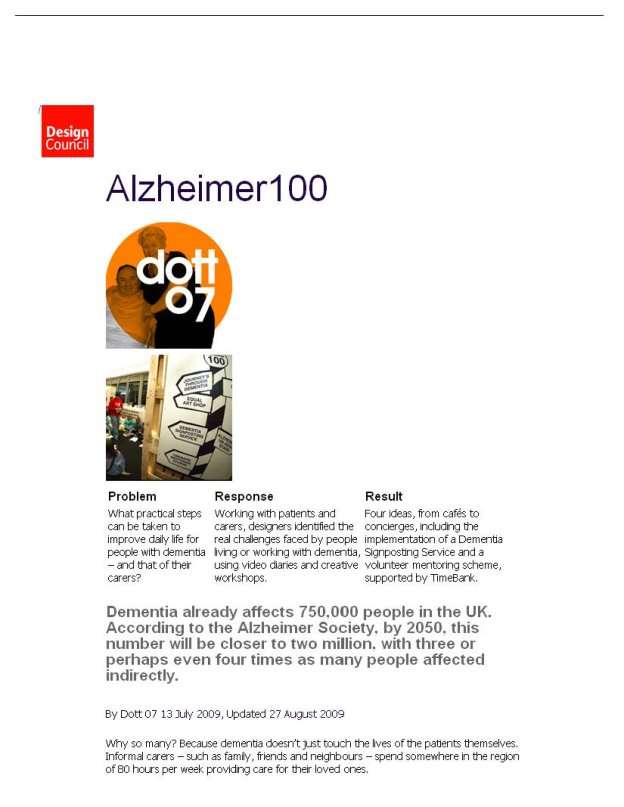

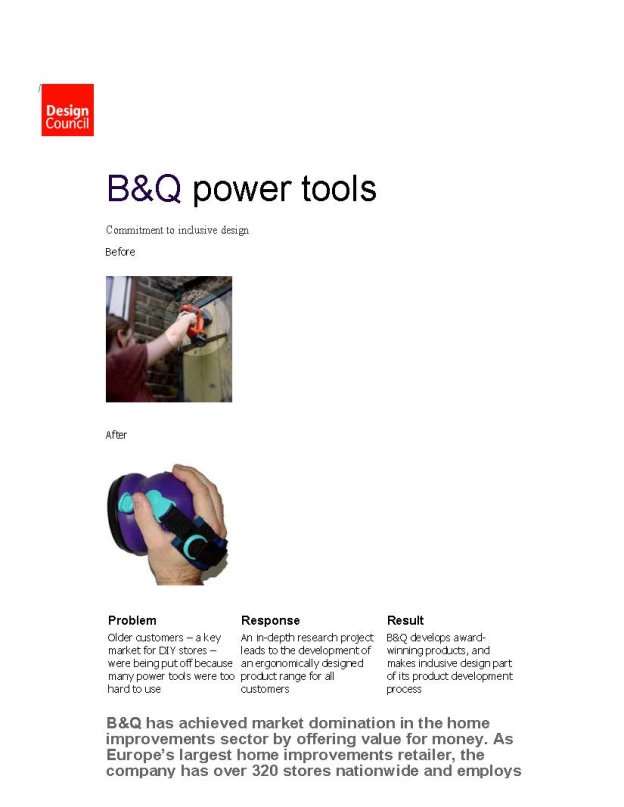
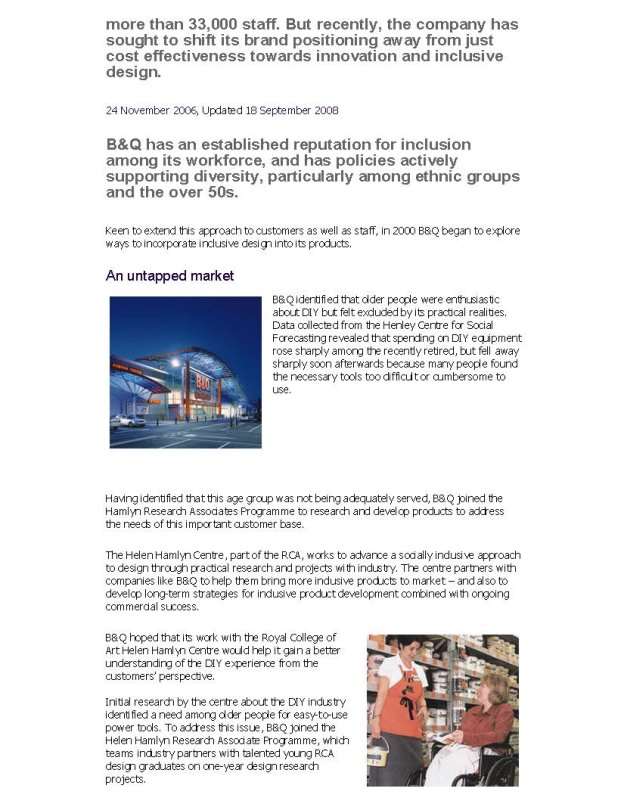

References
Activ.mob. (n.d.). What We Do [Online] Available at:http://activmob.org/ [Accessed 22 February 2017]
Alzheimer100 (n.d.). What is Alzheimer100? [Online] Available at:http://www.alzheimer100.co.uk/ [Accessed 22 February 2017]
B&Q (2016). Power Tools [Online] Available at:http://www.diy.com/departments/tools-equipment/power-tools/DIY637264.cat?Icamp=Nav_ToolsEquipment_PowerTools [Accessed 22 February 2017]
Design Council (2008). B&Q power tools.
Design Council (2009). Activmobs.
Dott. (2009). Alzheimer100. Design Council.
Engen, M. & Holen, I.E. (2014). Radical Versus Incremental Innovation: The Importance of Key Competences in Service Firms. Technology Innovation Management Review [Online] Available at:https://timreview.ca/article/781[Accessed 23 February 2017]
Henard, D.H. & Dacin, P.A. (2010). Reputation for Product Innovation: Its Impact on Consumers. The Journal of Product Innovation Management, 27(3), 321-335.
Tan, L. (2009). Co-designing for dementia: The Alzheimer 100 project. Australian Medical Journal, 1(12), 185-198.
Zhu, C.W. & Sano, M. (2006). Economic considerations in the management of Alzheimer’s disease. Clinical Intervention in Aging, 1(2), 143-154.